国际海上货物运输保险-讲义
- 格式:doc
- 大小:48.50 KB
- 文档页数:4
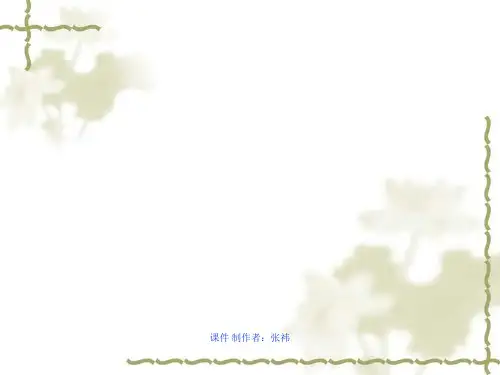
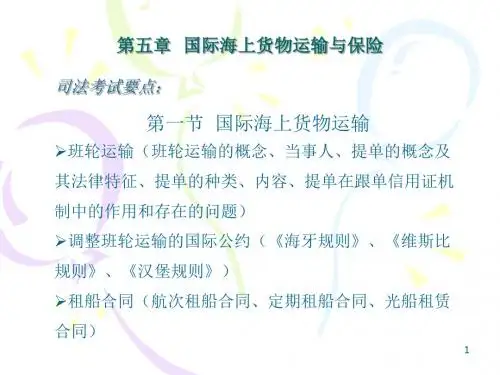
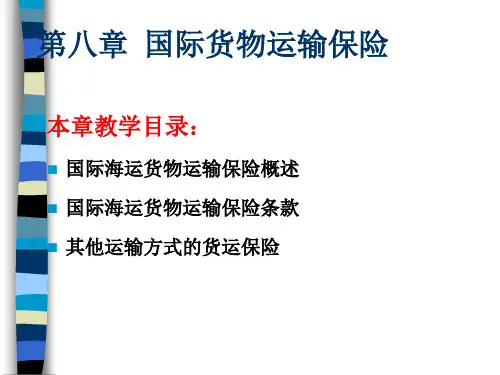


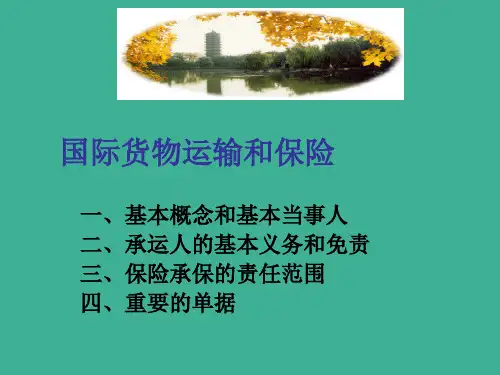
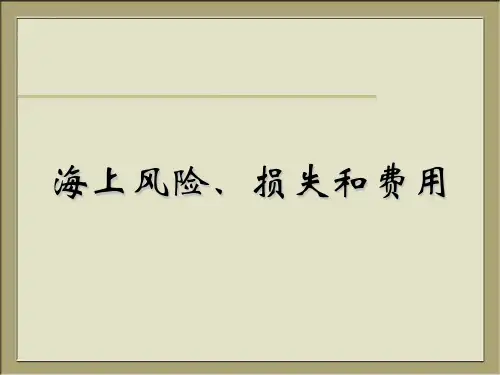


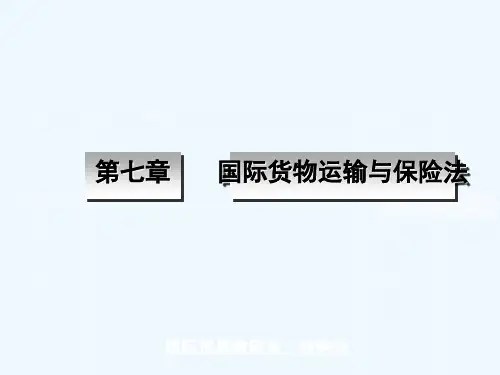
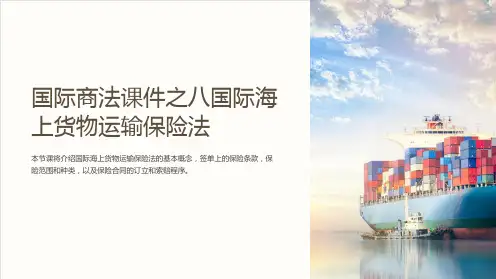
海上货物运输保险讲义课件一、引言海上货物运输保险是指在货物运输过程中,由于意外事故造成的货物损失或损坏所引起的损失,由保险公司承担的风险保障。
海上货物运输保险广泛应用于国际贸易中,为货物所有者提供了重要的保障,保障了国际贸易的顺利进行。
本讲义将介绍海上货物运输保险的基本概念、原则、类型以及索赔流程等内容。
二、海上货物运输保险的基本概念海上货物运输保险是一种保险合同,保险公司为货物所有者在货物运输过程中承担因意外事故而导致的货物损失或损坏的风险。
保险合同中明确了保险责任、保险金额、保险费率等内容。
货物所有者需要购买海上货物运输保险来保障货物的安全。
三、海上货物运输保险的原则1. 最高诚信原则保险合同的订立和履行应遵循最高诚信原则,即保险合同各方应诚实、真实地向对方披露相关信息,遵循合同约定的义务。
2. 保险利益原则保险合同的订立和履行应确保保险受益人的合法权益,保险受益人是指在保险事故发生时有权受到保险金赔付的人。
3. 共同利益原则保险公司和投保人在保险合同履行过程中应共同维护保险合同的有效性和公平性,并通过合作解决问题。
四、海上货物运输保险的类型海上货物运输保险可分为以下几种类型:1. 全险全险是指保险公司对在整个货物运输过程中的一切风险负责,包括自然灾害、海盗袭击、运输工具事故等造成的货物损失。
2. 战争险战争险是指保险公司对由于战争、敌对行动或与之相关的事件造成的货物损失负责。
3. 罢工险罢工险是指保险公司对由于罢工、工人骚乱等事件造成的货物损失负责。
4. 综合险综合险是指将全险、战争险、罢工险等多种险种进行组合,提供更全面的保障。
五、海上货物运输保险的索赔流程1. 保险事故发生保险事故是指货物在运输过程中发生的意外事故,导致货物损失或损坏。
2. 报案货物所有者在发现保险事故发生后,需要及时向保险公司报案,并提供相关证明材料。
3. 理赔审核保险公司会对报案进行审核,核实货物损失情况,并根据保险合同的约定确定赔偿金额。
CHAPTER 3 INTERNATIONAL MARINE INSURANCE第三章国际海上货物运输保险法[Aims and Requirements] This chapter is aimed to help the students to have a basic knowledge concerning the international marine insurance, including the conclusion of contract, principles of insurance, insurance policy, liabilities of the insurer and marine insurance clauses.Section A. Contract of Marine Insurance第一节海上保险合同[Main Content]I. Contract of Marine InsuranceA contract of marine insurance is a contract whereby the insurer undertakes, as agreed, to indemnify the loss to the subject matter insured and the liability of the insured caused by perils covered by the insurance against the payment of an insurance premium by the insured.II. Certain Terminologies1. Insurer (underwriter)2. Insured3. Insurable Interest4. Applicant for Insurance5. Subject-matter insured6. Insurance accident7. Insured amountIII. Basic Principles of Marine Insurance1. Principle of Insurable Interest(1) The meaning of insurable interestAn insurable interest refers to the interest which the applicant has in the subject matter of the insurance and is recognized by laws. The subject matter of the insurance refers to either to the property of the insured and related interests associated therewith, or to the life and body of the insured, which is the object of the insurance.(2) The significance of insurable interest2. Principle of Utmost Good Faith(1) The Meaning of utmost good faithA positive duty to voluntarily disclose, actually and fully, all facts material to the risk being proposed, whether asked for them or notInsurance Law: “any insurance activity shall be in conformity with laws and administrative regulations and shall be conducted voluntarily under the principle of utmost good faith”.(2) Representations and warranties(3) Breach of the doctrine of Utmost Good Faith3. Principle of Indemnity(1) The meaning of Indemnity“Indemnity can be defined as exact financial compens ation. It is sufficient to place the insured in the same financial position after a loss as he can enjoy the benefit before it occurs.”In other words, when claims occur in property insurance, the insurer will pay the claims to the insured if the damage or loss is covered by the policy conditions.(2) Measurement of indemnity(3) Factors limiting the payment of indemnity4. Principle of Proximate Cause(1) The Meaning of proximate cause“Proximate cause is an active and efficient cause that sets a trai n of events in motion and brings about a result. If there are several causes operating simultaneously, the proximate one will be the dominant or the most forceful one operating to bring a result.(2) Occurrence of trains of event(3) How do we determine the efficient cause?IV. The Conclusion of Marine Insurance ContractV. Insurance Policy1. Function of the Policy2. Assignment of the Policy3. Floating Policy & Open Cover[Key Points and Difficult Points]1. Insurable Interest2. Utmost Good Faith3. Open Cover[Questions]1. Describe different types of insurable interests.2. What is utmost good faith?3. What are the functions of Policy?Section B. Obligation of the Insurer and Insured第二节保险人与被保险人的义务[Main Content]I. Obligations of the Insured1. The insured shall pay the premium immediately upon conclusion of the contract.2. The insured shall notify the insurer in writing immediately where the insured has not complied with the warranties under the contract.3. Upon the occurrence of the peril insured against, the insured shall notify the insurer immediately and shall take necessary and reasonable measures to avoid or minimize the loss.II. Liability of the Insurer1. The insurer is responsible for the issue of insurance policy.2. The insurer shall indemnify the insured promptly after the loss from a peril insured against has occurred.3. But the insurer is not liable for the loss or damage rising from any of the following causes:(1) Delay in the voyage or in the delivery of cargo or change of market price;(2) Fair wear and tear, inherent vice or nature of the cargo;(3) Improper packing.III. Perils under Marine Insurance1. Natural calamitiesSuch as weather, thunder and lighting, tidal wave, earthquake, floods, etc.2. Fortuitous accidentsSuch as ship stranded, striking upon the rocks, ship sinking, ship collision, colliding with icebergs, fire, explosion, etc.3. Extraneous risksThis cover theft, rain, shortage, leakage, breakage, dampness, etc. They may include special risks, such as war risks, strikes, non-delivery of cargo, refusal t receive cargo, etc.IV. Losses covered by Marine Insurance1. Total loss(1) Actual total loss(2)Constructive total loss2. Partial loss(1) General Average(2) Particular Average[Key Points and Difficult Points]1. Obligations of the insured2. Liability of the insurer3. Constructive total loss4. General Average5. Abandonment[Questions]1. What is abandonment? Does the insurer have the obligation to accept abandonment?2. What are the differences between actual total loss and constructive total loss?3. What does General Average refer to? Please give an example.Section C Marine Insurance Clauses第三节海上保险合同条款[Main Content]I. Marine Insurance Clauses1. London Institute Cargo Clause (ICC)(1) Institute Cargo Clause A(2) Institute Cargo Clause B(3) Institute Cargo Clause CEXCLUSIONS2. PICC Ocean Marine Cargo ClausesAccording to the stipulat ions of the People’s Insurance Company of China, the following basic insurance covers are available in marine insurance:(1) Free From Particular Average (FPA)Under FPA the insurance company will be resposible to pay claims for total or constructive total losses suffered by the whole lot of cargoes during transportation due to such natural calamities as vile weather, thunder and lighting, tidal wave, earthquakes, and floods, ot for total or partial losses due to the ship or carrier being on fire, stranded, sinking, colliding or meeting other fortuitous accidents.(2) With Particular Average (WA)The cover of this insurance is more extensive. The insurer is liable, in addition to the total or constructive total losses covered by FPA insurance, also for the partial losses of the insured goods due to the risks caused by natural calamities not mentioned under FPA.(3) All RisksUnder an “all risks” policy the goods are insured against all risks, e.g. from natural calamities, fortuitous accidents at sea, or general extraneous risks, irrespective of percentage of loss, total or partial. A natural deterioration of perishable goods, delay, loss or damage caused by inherent vice nature of the subject matter are not covered.EXCLUSIONSPICC Cargo Clauses do not cover:(1) Loss or damage caused by the intentional act or fault of the Insured.(2) Loss or damage falling under the liability of the consignor.(3) Loss or damage arising from the inferior quality or shortage of the insured goods prior to the attachment of this insurance.(4) Loss or damage arising from normal loss, inherent vice or nature of the insured goods, loss of market and/or delay in transit and any expenses arising therefrom.(5) Risks and liabilities covered and excluded by the Ocean Marine Cargo War Risks Clauses and Strike, Riot and Civil Commotion Clauses.3. War Risks Clause & Strike Risks Clause(1)Institute Cargo Clause-War(2) Strike ClauseII. Commencement and Termination of Cover (warehouse to warehouse) seagoing vessel at the final port of discharge before they reach the above mentioned warehouse or place of storage. If prior to the expiry of the above mentioned sixty (60) days, the insured goods are to be forwarded to a destination other than that named in the Policy, this insurance shall terminate at the commencement of such transit.[Key Points and Difficult Points]1. FPA2. WA3. All Risks[Questions]1. When will the Cover be terminated?2. What is Free From Particular Average?。